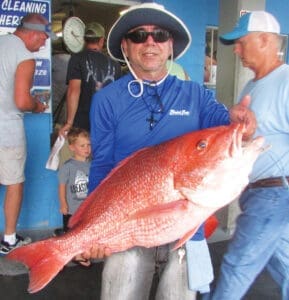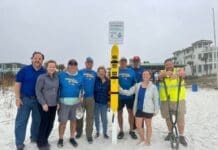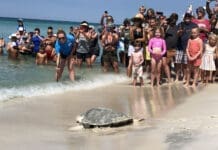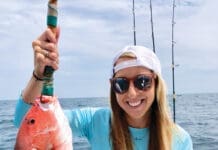17-Day Extension of Record Gulf Recreational Red Snapper Season
 Gov. Ron DeSantis announced Florida is extending the already record 2023 recreational Gulf red snapper season by 17 days, adding every Friday through Saturday in September, Labor Day, and Thanksgiving Day to the previously announced season. The 2023 season now totals 87 days, the longest combined season since the state assumed management of red snapper.
Gov. Ron DeSantis announced Florida is extending the already record 2023 recreational Gulf red snapper season by 17 days, adding every Friday through Saturday in September, Labor Day, and Thanksgiving Day to the previously announced season. The 2023 season now totals 87 days, the longest combined season since the state assumed management of red snapper.
Those fishing from private recreational vessels in state and federal waters in the Gulf, and charter vessels without a federal reef fish permit that are limited to fishing in state waters, will be able to participate in the 2023 Gulf red snapper season.
“I am proud to extend our historic Gulf red snapper season and provide even more opportunities for anglers of all ages to see why Florida is the Fishing Capital of the World,” said Governor Ron DeSantis. “While Biden and his federal agencies shorten seasons and strangle fishing opportunities elsewhere, we’re showing what responsible, freedom-minded government can accomplish.”
“The Gulf red snapper season brings anglers from across the country to enjoy this recreational opportunity,” said FWC Executive Director Roger Young. “Being able to extend the season 17 days will allow additional access and opportunities to all who want to experience the Fishing Capital of the World.”
These dates extend the fall season by 17 days. The fall season now includes every Friday–Sunday throughout the months of September, October, and November as well as Labor Day and Thanksgiving Day. See the updated fall season dates below:
September 1–4 (Friday–Monday of Labor Day Weekend)
September 8–10
September 15–17
September 22–24
September 29–October 1
October 6–8
October 13–15
October 20–22
October 27–29
November 3–5
November 10–12 (Veterans Day Weekend)
November 17–19
November 23–26 (Thanksgiving Weekend)
Make your plans to get on the water, and if you want to fish for red snapper in state or federal waters from a private recreational vessel, even if you are exempt from fishing license requirements, you must sign up as a State Reef Fish Angler (annual renewal required) at GoOutdoorsFlorida.com.
Find more on recreational snapper regulations at myfwc.com.
Florida Spiny Lobster Seasons
The 2023-24 spiny lobster season began its regular commercial and recreational lobster season on Aug. 6 and will run through March 31, 2024.
“My family and I look forward to spiny lobster season every year along with thousands of other Floridians,” said Florida Fish and Wildlife Conservation Commission (FWC) Chairman Rodney Barreto. “It’s a great time to get out on the water with loved ones. I hope everyone takes care to practice safe boating and make sure to do your part to protect Florida’s coral reefs.”
Learn more about bag limits, size limits, where to harvest and other regulations at MyFWC.com/Marine by clicking on “Recreational Regulations” and “Lobster,” under the “Crabs, Lobster and other Shellfish” tab. If you plan to lobster in the Keys, another great resource is the Monroe County Tourist Development Council website KeysLobsterSeason.com.
Don’t forget to get your license and spiny lobster permit at GoOutdoorsFlorida.com.
Looking to keep up to date on Florida’s saltwater fishing regulations? Find them on the Fish Rules app. Learn more at FishRulesApp.com or follow Fish Rules at Instagram.com/FishRulesApp or Facebook.com/FishRulesApp.
If bully netting this season, please keep lights directed toward the water and avoid shining them at houses or people along the shoreline. Please be considerate of others by keeping sound levels low when near shoreline residences.
Don’t forget to use care around corals and other marine life. The FWC launched the Florida Coral Crew to engage sportsmen and women in the effort to combat Stony Coral Tissue Loss Disease. Before you go out looking for lobster, you can sign up to join the crew at FLCoralCrew.com.
Be safe when diving for lobster. Wear a life jacket when underway and do not drink and boat. When lobstering in open water, divers should stay within 300 feet of a properly displayed divers-down flag or device and within 100 feet of a properly displayed divers-down flag or device if near an inlet or navigation channel. Boat operators traveling within 300 feet of a divers-down flag or device in open water or within 100 feet of one on an inlet or navigational channel must slow to idle speed. For more information, visit MyFWC.com/Boating/Regulations and click on “Divers-down Warning Devices.”























































